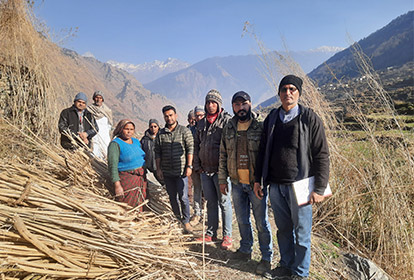Reverse Migration
Restoring Communities Through Bringing Migrants Back Home
High out-migration is a feature of the state of Uttarakhand in general, and the district of Rudraprayag in particular. Loss of traditional livelihoods through deforestation and forest degradation is one of the major factors behind this trend. The impacts are many and far-reaching.
What These Terms Mean
Most of the people have moved to urban centers of the state from remote hilly villages, rather than out of the state. That, however, does not minimize the adverse effects of such rural to urban migration.
Migration Patterns in Uttarakhand
A 2018 report in a national newspaper quotes the Rural Development and Migration Commission of Uttarakhand to point out the migration pattern in the area after the 2011 Census.
Another reputed national daily refers to the same report to indicate additional details.
The two reports taken present the following information:
- The 2011 Census of India report mentions 1053 ghost villages that have no one living there any longer.
- Since the 2011 Census, an additional 734 villages have become completely depopulated.
- In an additional 565 villages, the population has declined by 50%.
- A total of 383,726 people have left their homes during 2008-2018.
Impact of Migration
Seasonal and permanent migration from the Indian Himalayan Region (IHR) has engaged considerable academic attention. The main reason behind such attention constitutes in the far-reaching effects of out-migration from this geographical location.
Out-migration from the IHR has far-reaching ramifications that extend beyond the borders of the region. The uniqueness of the IHR implies that out-migration from the area has global significance. It adds to the problem of global warming and climate change.
Some of the adverse effects are as follows:
- An academic research paper informs that 71,410 hectares of agricultural land got abandoned during 2010-2013. That is a decline of 10.32% of cultivated land within just a span of three years.
- Continued rural-to-urban out-migration has resulted in large tracts of abandoned farmland in the state. That, in turn, leads to:
- Loss of soil fertility and degradation in natural plant succession.
- Adverse effects on the biodiversity of the area.
- Breakdown of community support systems.
- Loss of traditional wisdom related to area-specific ecological conservation.
Why Hemp To Reverse The Trend
Hemp grows naturally in Uttarakhand. The soil and the climate of the district is conducive to hemp farming.
That is the first reason that prompted us to choose hemp farming as the method for rejuvenating the economy of Uttarakhand.
The other considered factors are as follows:
- Hemp is easy to grow on infertile land and can rejuvenate degraded soil. Cultivating hemp in the barren tracts of Uttarakhand can, thus, facilitate the growth of other crops in the state. It can revive the agricultural potential of the area.
- Hemp is easy to grow and grows fast.
- Hemp is a versatile plant the whole of which can be used for myriad purposes. That allows the development of agro-industries based on hemp. That facilitates a comprehensive boost to the economy and reverse the trend of out-migration.




